FROM THE GIVEN RELATIONS FIND FOG AND GOF WORKSHEET
Subscribe to our ▶️ YouTube channel 🔴 for the latest videos, updates, and tips.
Problem 1 :
Functions f and g are defined as follows :
f = {(0, 2), (1, 3), (2, 0), (3, 1)}
g = {(0, 3), (1, 2), (2, 1), (3, 0)}
Find a) f ∘ g
b) g ∘ f
c) f ∘ f
Problem 2 :
f and g are defined as :
f = {(0, 3), (1, 0), (2, 1), (3, 2)}
g = {(0, 1), (1, 2), (2, 3), (3, 0)}
Find f ∘ g
Problem 3 :
f and g are defined as :
f = {(0, 2), (1, 5), (2, 7), (3, 9)}
g = {(2, 2), (5, 0), (7, 1), (9, 3)}
Find a) f ∘ g b) g ∘ f
Problem 4 :
a) If ax + b = cx + d for all values of x, show that a = c and b = d.
Hint : if it is true for all x, it is true for x = 0 and x = 1.
b) Given, f(x) = 2x + 3 and g(x) = ax + b and that (f ∘ g) (x) = x for all values of x, deduce that a = 1/2 and b = -3/2.
c) Is the result in b true if (g ∘ f) (x) = x for all x ?
Answer Key
1) a) Finding fog :
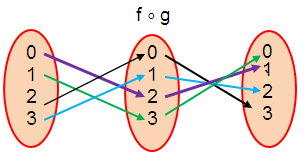
(f ∘ g) (0) = 1
(f ∘ g) (1) = 0
(f ∘ g) (2) = 3
(f ∘ g) (3) = 2
f ∘ g = {(0, 1), (1, 0), (2, 3), (3, 2)}
b) Finding gof :
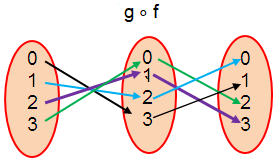
(g ∘ f) (0) = 1
(g ∘ f) (1) = 0
(g ∘ f) (2) = 3
(g ∘ f) (3) = 2
g ∘ f = {(0, 1) (1, 0) (2, 3) (3, 2)}
c) Finding fof :
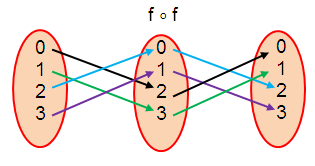
(f ∘ f) (0) = 0
(f ∘ f) (1) = 1
(f ∘ f) (2) = 2
(f ∘ f) (3) = 3
f ∘ f = {(0, 0), (1, 1), (2, 2), (3, 3)}
2)
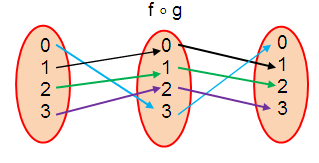
(f ∘ g) (0) = 0
(f ∘ g) (1) = 1
(f ∘ g) (2) = 2
(f ∘ g) (3) = 3
f ∘ g = {(0, 0), (1, 1), (2, 2), (3, 3)}
3)
a) f ∘ g :
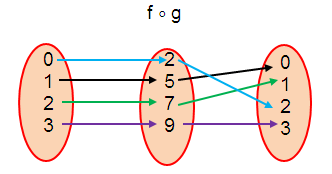
(f ∘ g) (0) = 2
(f ∘ g) (1) = 0
(f ∘ g) (2) = 1
(f ∘ g) (3) = 3
f ∘ g = {(0, 2), (1, 0), (2, 1), (3, 3)}
b) g ∘ f :
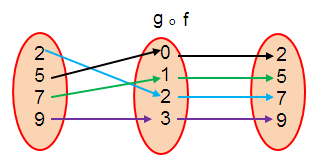
(g ∘ f) (2) = 7
(g ∘ f) (5) = 2
(g ∘ f) (7) = 5
(g ∘ f) (9) = 9
g ∘ f = {(2, 7), (5, 2), (7, 5), (9, 9)}
4) a) a = c
b) a = 1/2 and b = -3/2
c) So, the result in b is true.
Subscribe to our ▶️ YouTube channel 🔴 for the latest videos, updates, and tips.
Recent Articles
-
Finding Range of Values Inequality Problems
May 21, 24 08:51 PM
Finding Range of Values Inequality Problems -
Solving Two Step Inequality Word Problems
May 21, 24 08:51 AM
Solving Two Step Inequality Word Problems -
Exponential Function Context and Data Modeling
May 20, 24 10:45 PM
Exponential Function Context and Data Modeling